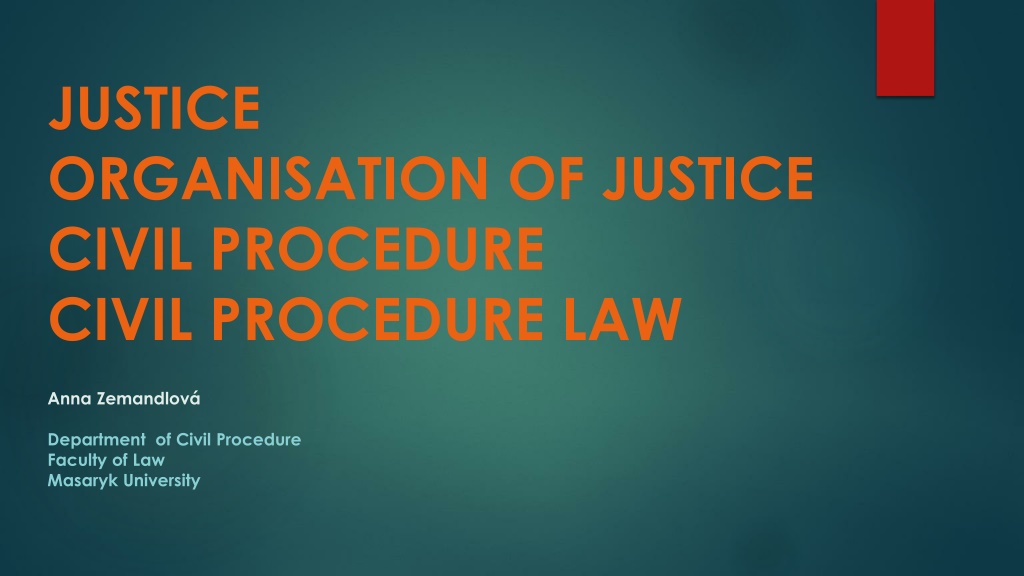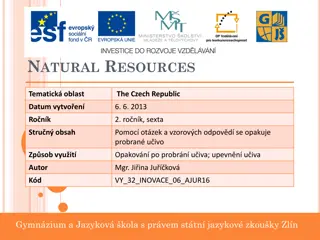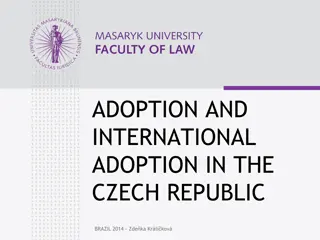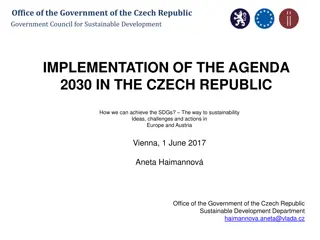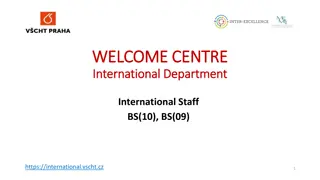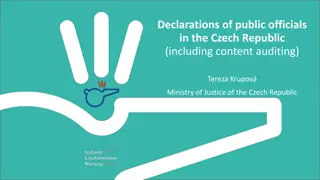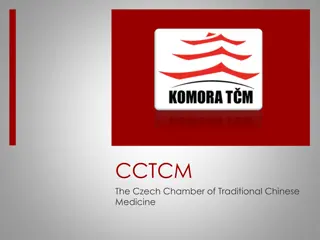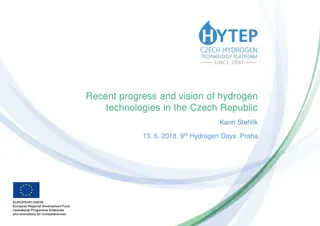Overview of Justice System in Czech Republic
Explore the legal framework and principles governing the justice system in the Czech Republic, including civil procedure, legislation, constitutional grounds, essential attributes, and the organization of justice. The system covers civil, criminal, administrative, and constitutional justice, emphasizing the independence, impartiality, and statutory judge principles upheld by the courts.
Download Presentation

Please find below an Image/Link to download the presentation.
The content on the website is provided AS IS for your information and personal use only. It may not be sold, licensed, or shared on other websites without obtaining consent from the author.If you encounter any issues during the download, it is possible that the publisher has removed the file from their server.
You are allowed to download the files provided on this website for personal or commercial use, subject to the condition that they are used lawfully. All files are the property of their respective owners.
The content on the website is provided AS IS for your information and personal use only. It may not be sold, licensed, or shared on other websites without obtaining consent from the author.
E N D
Presentation Transcript
JUSTICE ORGANISATION OF JUSTICE CIVIL PROCEDURE CIVIL PROCEDURE LAW Anna Zemandlov Department of Civil Procedure Faculty of Law Masaryk University
JUSTICE LEGISLATION, CONSTITUTIONAL GROUNDS, ESSENTIAL ATTRIBUTES, SYSTEM
LEGISLATION Constitution of the Czech Republic (No. 1/1993 Sb.) Charter of the Fundamental Rights and Freedoms (Constitutional Act No. 2/1993 Coll.) Act on Courts and Judges (No. 6/2002 Coll.) Code of Civil Procedure (No. 99/1963 Coll.) Special Proceedings Act (No. 292/2013 Coll.) Code of Administrative Justice (No. 150/2002 Coll.) https://www.usoud.cz/en/legal-basis/ http://public.psp.cz/en/sqw/hp.sqw?k=2060 http://www.nssoud.cz/docs/caj2002.pdf
CONSTITUTIONAL GROUNDS OF JUSTICE The rule of law principle (respect and judicial protection of the rights and freedoms of individuals) Art. 1 (1), Art. 4 of the Constitution State authority = legislative, executive, judicial bodies (autonomy, separation, independence) Judicial power - Chapter 4 of the Constitution courts and judges independency
ESSENTIAL ATTRIBUTES OF JUSTICE Judicial power = state power exercised by independents courts (protection of individual rights and interests) Considering and legally binding decision-making in individual cases Procedure set by the law (criminal, civil and administrative judicial procedure)
SYSTEM OF JUSTICE CIVIL JUSTICE (private law issues) CRIMINAL JUSTICE (guilt and punishment for criminal offences) ADMNISTRATIVE JUSTICE (protection against administrative decisions/inacion/unlawful interference) CONSTITUIONAL JUSTICE (protection of constitutionality)
ORGANISATION OF JUSTICE FUNDAMENTAL PRINCIPLES, JUDICIAL SYSTEM, COURTS HIERARCHY
FUNDAMENTAL PRINCIPLES Independence and impartiality of courts and judges Judiciary exercised only by courts Principle of statutory judge Involvement of public (lay judges)
INDEPENDENCE AND IMPARTIALITY OF COURTS AND JUDGES Judicial independence is not the private right of judges but the foundation of judicial impartiality and a consttutional right Independent judiciary (free from extraneous influence) Art . 6 ECHR Art. 81 s 82 of the Constitution Art. 36 of the Charter of Fundamental Rights and Freedoms 1 and 79 of the Act No 6/2002 Coll., on Courts, Judges, Lay judges and the State Administration of Courts
OBJECTIVE CONDITIONS AND GURANTEES Impartiality fundamental qualification of a judge and core attribute of the judiciary Personal qualities (ability to make impartial and independent decisions) Conditions of service and tenure (security of tenure, exclusion of removability/transfer to another court) Security of remuneration Incompatibility with other (public) functions/activities Appointment of judges (by president, no time limit) Publicity of court hearing Disciplinary liaability
STATUTORY JUDGE PRINCIPLE Nobody shall be denied his or her statutory judge. The jurisdiction of the court and the competence of the judge are set by law. (Art. 38 /1/ of the Charter) Prevention from external influence Statutory (transparetnt) rules for cases assignement to an individual judge (work time - schedule)
JUDICIAL SYSTEM Supreme Court/Supreme AdministrativeCourt (Brno) High Courts (Praha, Olomouc) District Courts (8) Regional Courts (63) Constitutional Court (Brno)
CONSTITUTIONAL COURT Judicial protection of constitutionality (special court system) 15 judges appointed for period of 10 years Structure - plenum (all judges), four three-member panels Scope of juisdriction - 87 of Constitution annulment of statutes/provisions contrary to the constitutional order annulment of other legal acts/individual provisions contrary to constitutional order or a statute constitutional complaints individuals/legal persons against final decisions /interference of public authorities representative body of a self-governing region against an unlawful interferebce of the state jurisdictional disputes between state bodies, state bodies and bodies of self-governing regions, and between bodies of self-governing regions constitutional charge brought by the Senate against the president etc.
SUPREME ADMINISTRATIVE COURT The highest judicial authority in matters falling within the competence of administrative courts Chambers (three member, seven/nine member extended chamber, special chamber) Unity and legality of the case-law of regional courts and administrative authorities cassation complaint (challenging final decisions of regional courts in matters of administrative justice, against the decisions of regional courts on the measures of a general nature, issues of local and regional referendum) protection against inaction protection against unlawful interference electoral matters (incl. presidential election) registration and dissolution of political parties and movements positive /negative conflicts of competence (administrative authorities and/or territorial or professional self- governing bodies) disciplinary court (judges, state prosecutors and enforcement agents)
COURT HIERARCHY Two-instance (three tier) system Court of first instance Regional court District court Court of appeal High Court Regional court
SUPREME COURT The highest judicial authority in civil and criminal matters (except matters decided by Constitutional and Supreme Administrative Court) Consistency and legality of decisions Composition and Structure: Panels (chairman and two judges) - extraordinary appeal, complaints for the violation of law (criminal cases), recognition and enforcement of decisions issued by foreign courts (if required by a special legal regulation/international agreement) Grand Panels (min. nine judges of the same division) legal opinion of a panel is different than expressed in the prior case-law Divisions (Civil Law and Commercial Division and the Criminal Division) ensure legality and consistency of decision-making of the courts by adoptiing standopints , selection of judgements and decide on their publication Plenum (President, Vice-President, Heads of the Divisions, Chairmen of the Panels and other judges of the Supreme Court) the most important body - adoption of standpoints in the matters of particular kind, issues pertaining to both Divisions , issues disputable between the Divisions
HIGH COURTS 2 high courts seated in Brno and Olomouc Three-member panels courts of second instance in cases decided at first instance by the regional courts belonging to their areas
REGIONAL COURTS 7 regional courts and Municipal Court in Prague (three- member panels/single judge) courts of second instance in cases decided at first instance by the district courts belonging to their areas courts of first instance - 9 (2) of the Civil Procedure Act ( courts of administrative justice (Code of Administration Justice)
DISTRICT COURTS Area courts in Prague, Municipal Court in Brno courts of first instance - 9 (1) of the Civil Procedure Act - general rule
COURT ADMINISTRATION Ministry of Justice of the Czech Republic - central state administrative body for the courts Administratitive activity directly/by presidents of the courts Proper function of the judicial system
CIVIL PROCEDURE CHARACTER, TYPES
FUNDAMENTAL ATTRIBUTES the procedure of court and participants in civil judicial proceedings to assure protection of private rights and lawful interests of the participants court = independent and impartial decision-making body Legally binding (enforcable) decision
TYPES Contenious proceedings (litigation, adversary) Non-contentious (special) proceedings (prevention, protection) Initial proceedings (court trial) Execution proceedings
CIVIL PROCEDURE LAW DEFINITION AND SOURCES
DEFINITION set of rules regulating civil procedure (rights and duties of the participating subjects) participating subjects court, parties and other bodies/persons
SOURCES OF CIVIL PROCEDURE LAW Code of Civil Procedure (No. 99/1963 Coll.) Special Proceedings Act (No. 292/2013 Coll.)
THANK YOU ANNA.ZEMANDLOVA@LAW.MUNI.CZ
